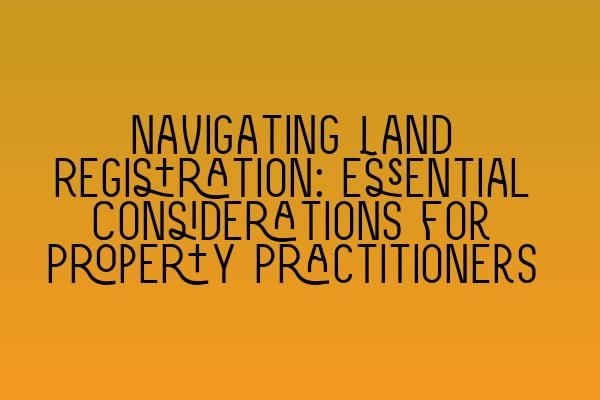Navigating Land Registration: Essential Considerations for Property Practitioners
As property practitioners, understanding land registration is vital for successfully navigating the legal landscape. Whether you’re dealing with residential or commercial transactions, having a solid grasp of land registration can save you and your clients from potential complications and disputes down the line. In this article, we’ll explore the essential considerations for property practitioners when it comes to land registration.
1. Understanding the Land Registration Act
The cornerstone of land registration in the UK is the Land Registration Act 2002. This legislation governs the registration of land, providing a clear framework for the process. Familiarize yourself with the Act, as it outlines the legal requirements and procedures for land registration.
2. Identifying the Type of Land Registration
There are two main types of land registration: registered and unregistered. Registered land has been officially recorded and documented with the Land Registry, while unregistered land lacks this official registration. It’s crucial to determine whether the land in question is registered or unregistered, as it affects the legal rights and obligations associated with the property.
3. Conducting Title Searches
When dealing with registered land, it’s essential to conduct thorough title searches. This involves obtaining official documents from the Land Registry, such as the Register of Title, Title Plan, and any relevant registered documents. These searches will provide you with valuable information about the property, including its boundaries, ownership, and any existing charges or restrictions.
4. Identifying and Dealing with Restrictions
Restrictions on land can have significant implications for property transactions. It’s crucial to identify and understand any restrictions that may affect the land, such as easements, covenants, or rights of way. These restrictions can impact how the land can be used, built upon, or transferred. Careful consideration and potential negotiations may be required to address these restrictions during the transaction process.
5. Dealing with Priority of Interests
The priority of interests refers to the order in which interests in the land are ranked and enforced. When multiple interests exist, such as charges, leases, or rights of occupation, it’s crucial to determine their priority and ensure that all interests are properly recorded and protected. Failure to address priority issues can lead to complications, disputes, and potential loss of rights.
6. Overcoming Adverse Possession Claims
Adverse possession occurs when someone occupies another person’s land without permission and for a specified period of time. As a property practitioner, it’s essential to be aware of potential adverse possession claims and take appropriate steps to protect your client’s interests. This can include reviewing historical land records, conducting site inspections, and advising clients on potential risks.
7. Dealing with Leasehold and Freehold Properties
Understanding the differences between leasehold and freehold properties is crucial when dealing with land registration. Leasehold properties involve a lease agreement between the owner of the land (the freeholder) and the occupier (the leaseholder). Freehold properties, on the other hand, provide full ownership rights to the land and buildings. Consider the unique considerations and requirements associated with each type of property when navigating land registration.
8. Compliance with Legal Requirements
Property practitioners must ensure compliance with all legal requirements regarding land registration. This includes submitting accurate and complete documentation to the Land Registry, adhering to prescribed time frames, and paying the necessary fees. Failure to meet these requirements can lead to delays, penalties, and potential legal consequences.
9. Staying Updated on Changes in the Law
Land registration laws can change, and it’s essential for property practitioners to stay updated on any legislative amendments or case law developments. Regularly review legal updates and industry publications to ensure you’re aware of any changes that may impact land registration processes and procedures.
By following these essential considerations for property practitioners, you can navigate land registration with confidence, ensuring your clients’ interests are protected and transactions proceed smoothly. Stay knowledgeable, conduct thorough research, and seek legal advice when necessary to effectively manage land registration matters.
For further preparation on property law and land law, consider exploring our related articles:
– SQE 1 Practice Exam Questions
– SQE 1 Practice Mocks FLK1 FLK2
– SQE 2 Preparation Courses
– SQE 1 Preparation Courses
– SRA SQE Exam Dates
At SQE Property Law & Land Law, we offer comprehensive courses and resources to help you succeed in your legal career. Stay updated, practice, and enhance your skills to become a proficient property practitioner.
